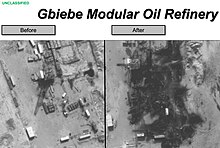Finances of the Islamic State
[3] In the time period studied, cells were required to send up to 20% of the income generated from kidnapping, extortion rackets and other activities to the next level of the group's leadership.
[3] The records show that IS depended on members from Mosul for cash, which the leadership used to provide additional funds to struggling militants in Diyala, Salahuddin and Baghdad.
[3] In mid-2014, the Iraqi National Intelligence Service obtained information from an IS operative which revealed that the organisation had assets worth US$2 billion,[4] making it the richest jihadist group in the world.
[24] Air strikes by the US-led coalition fighting IS and in the wake of the terror attacks in Paris, destroyed hundreds of trucks the Islamic State had been using to transport its oil.
Abdulamir al-Hamdani, an archaeologist from Stony Brook University, has said that IS is "looting... the very roots of humanity, artefacts from the oldest civilizations in the world".
[22] It is difficult to accurately measure the revenue from artifacts, as they are primarily sold on the black market, but National Geographic estimates it may be in the tens of millions USD.
All of these taxes imposed by Islamic State have some form of Quranic or historical basis except for the fay', giving the administration freedom of interpretation that could explain its higher rate.
[13] Political scientist Colin P. Clarke of the RAND Corporation, writing after the end of the 2016–2017 Battle of Mosul in July 2017, stated that with IS's territorial losses causing declines in the organization's revenue from taxation of the local populations it once controlled, as well as from extortion from oil, gas, phosphate, and cement production, that the group would likely seek new revenue streams from drug trafficking.
It is able to produce crops worth possibly US$200 million per year if properly managed, and the UN Food and Agricultural Organization believes that 40% of Iraq's wheat-producing land is under IS control.
Private donors within Qatar, sympathetic to the aims of radical groups such as al-Nusra Front and IS, are believed to be channelling their resources to support these organisations.
According to some reports, U.S. officials believe that the largest portion of private donations supporting IS and al-Qaeda-linked groups now comes from Qatar rather than Saudi Arabia.
[40] In August 2014, a German minister Gerd Müller accused Qatar of having links to IS, stating "You have to ask who is arming, who is financing ISIS (IS) troops.
Qatari foreign minister Khalid bin Mohammad Al Attiyah stated: "Qatar does not support extremist groups, including [IS], in any way.
[45][46] Iran and Iraqi Prime Minister Nouri al-Maliki have accused the governments of Saudi Arabia and Qatar of funding the group.
[47][45][48] Ahead of the pro-Iraq, anti-IS conference held in Paris on 15 September 2014, France's foreign minister acknowledged that a number of countries at the table had "very probably" financed IS's advances.
They have worked openly with the United States in the arming other rebel groups the US hopes will fight IS and retake territory in Syria and Iraq.
